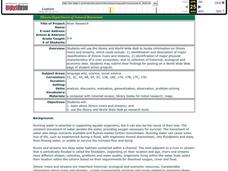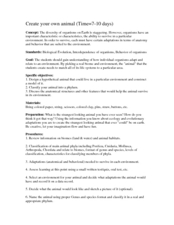Curated OER
Native vs. Non-native Species: Who Will Win?
Young scholars examine non-native species and the problems they have caused in the waters of the Chesapeake Bay. They create a "Wanted" poster for one of the species. They describe the effects of non-native species on the schoolyard...
Curated OER
Creating an Experimental Design
Pupils research the damage to the environment by certain plant species. They create an experimental design which they test how these species take over certain habitats. They share their information with the class.
Curated OER
Shedding Light on Watersheds
Students discuss what a watershed is, complete online activities showing them how to take care of a watershed, and create a model of a watershed that they experiment with to see what happens when it is disrupted by civilization.
Curated OER
Galapagos Adaptations
Students examine photographs of closely related species found in the Gal??pagos environment, observe differences and similarities between species, and form hypotheses about species differences and the relationship to the environment of...
Curated OER
Oceanography
Second graders identify saltwater and freshwater habitats and the resources found in them. They compare and contrast the two habitats and discuss their findings. They discover the resources bodies of water can provide.
Curated OER
Make Way for Wild Migrants
Learners discuss the threats facing migratory species and track the seasonal journeys of wildlife in real space and in cyberspace. Once they have gathered information from several sources, they create a portfolio to share with others...
Curated OER
River Research
Students use the internet to research the streams and rivers found in Illinois. Using the information, they identify and describe the rivers and streams along with the physical characteristics of a river ecosystem. They share what they...
Curated OER
Biosphere
Students examine the basic biosphere and its components. In this ecology activity students complete several experiments including designing a system that is balanced to sustain life.
Curated OER
Mangrove Ecology and Adaptations
Learners create a plant or animal that would be well adapted to a habitat they selected. They first learn about Mangroves and their specific adaptations that help them survive in their habitat.
Curated OER
The Big Wet
Middle schoolers research areas of Australia and other parts of the world characterized by a tropical wet and dry climate.
Curated OER
Animal Movements
Students discuss the behavior of different animals and how they move. They explore the ways that this helps them live and find food in their environment. They participate in a game that requires them to mimic the ways in which animals move.
Curated OER
Desert Tortoise Tale
Students listen to a reading of the "Desert Tortoise Tale" and complete a maze that highlights the different threats the baby tortoise faces along the way. They discuss the reasons the Desert Tortoise is becoming endangered.
Curated OER
Reclamation and Recycling
Students learn the importance of plants and animals, ecosystems and habitats... and see how these factors guide mining reclamation projects. They then discover the importance of recycling, and the difference between manufacturing with...
Curated OER
Riparian: The Guardian of the Waterways
Students become educated on what a riparian is, the need for riparian, and how a riparian corridor (forest, habitat) can protect waterways. Students construct dioramas depicting riparian habitats.
Curated OER
It's For the Birds
Fifth graders examine how anatomical adaptations make it possible for a bird to survive in various habitats. They discuss and list birds and their unique characteristics, and create an imaginary bird, illustrating the environmental...
Curated OER
Reclamation and Recycling
Young scholars examine the many uses of mined lands after reclamation has been completed and discover the importance of recycling finding the difference between manufacturing with recycled materials and newly extracted materials.
National Park Service
Living & Non-Living Interactions
What better way to learn about ecosystems than by getting outside and observing them first hand? Accompanying a field trip to a local park or outdoor space, this series of collaborative activities engages children in...
Curated OER
Sustainable Livestock
Students investigate healthy eating habits by researching livestock. In this food sustainability lesson, students research the negative impact factory farming has on our environment due to pollution. Students define agricultural...
National Wildlife Federation
The Tide is High, but I’m Holding On… Using ICESat Data to Investigate Sea Level Rise
Based on the rate of melting observed from 2003-2007 in Greenland, it would take less than 10 minutes to fill the Dallas Cowboys' Stadium. The 17th lesson in a series of 21 has scholars use the ICESat data to understand the ice mass...
Curated OER
Turtle and Tortoise Preschool Lesson Plan
One of the best parts about teaching the littlest learners is that you can create thematic lessons that use one topic to address every subject. Here is a nice set of thematic teaching ideas that uses turtles and tortoises to teach...
Curated OER
Create Your Own Animal
Students design and create their own hypothetical animal. In this biology lesson plan, students identify the factors organisms need to survive. They classify their animals according to its correct phylum.
Curated OER
Wildlife
The centerpiece of this lesson plan is a predator-prey simulation in which colored paperclips represent different species of animals camouflaged against a colored background. Relevant follow-up questions are provided. The activity is...
Curated OER
Boom and Bust
Students investigate commercial fishery. In this fishery lesson, students describe stages in commercial fishery, interpret data and predict when a fisher stock is showing signs of overexploitation.
Curated OER
Environmental Problems and Solutions
In this environmental problems and solutions worksheet, students are given a list of 25 environmental problems. They match them with a given solution and paste the matching pairs to a piece of construction paper.

























